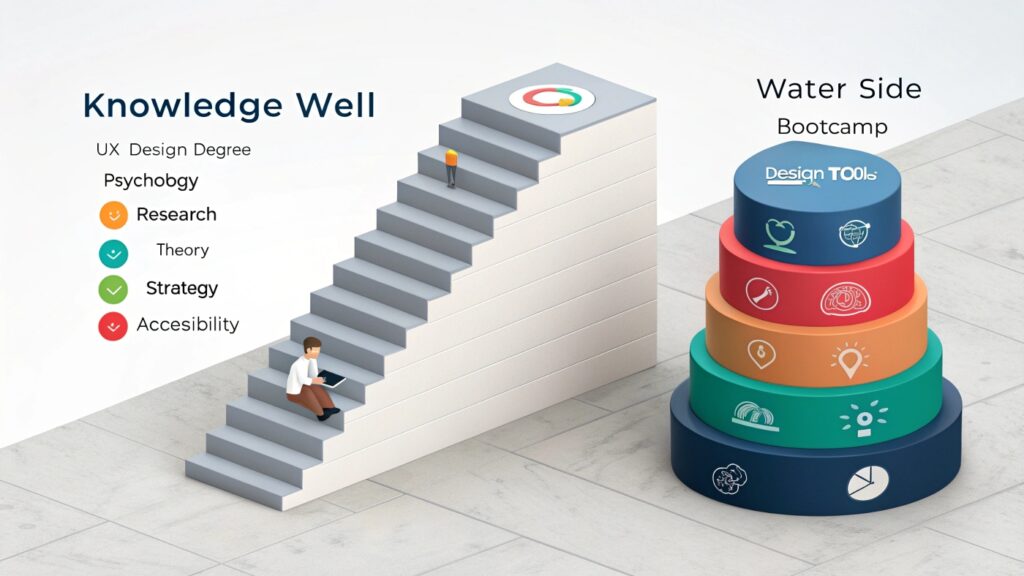Are you torn between enrolling in a UX bootcamp or investing in a UX Design Degree? You’re not alone. With the demand for UX professionals stronger than ever, choosing the right learning path can feel overwhelming.
On one hand, bootcamps promise quick results and fast-track training. On the other, a UX Design Degree offers a deeper and more structured way to learn. The question is which one gives you the strongest foundation for long-term success?
In this blog, we’re exploring the 9 powerful reasons why a UX Design Degree wins over a UX bootcamp. Whether you’re just starting out in design or planning the next big step in your career, you’ll see why a degree often pays off in more ways than one.
Best 9 Reasons a UX Design Degree Wins Over UX Bootcamp

Reason 1 – Stronger Academic Foundations
A UX Design Degree provides what bootcamps often skip academic depth. While bootcamps rush to teach design tools, degree programs include essential concepts like:
- Human-computer interaction
- User psychology
- Research methods
- Cognitive science
- Information architecture
This foundation matters because UX isn’t just about making things look good it’s about creating intuitive, usable experiences that solve real problems. Graduates of degree programs are better equipped to think critically, troubleshoot challenges, and understand users at a deeper level.
Bootcamps give quick exposure to skills, but degrees help you master the “why” behind design choices. This makes you not just a designer, but a problem-solver.
Reason 2 – Comprehensive Curriculum Beyond Design Tools
A UX bootcamp often zooms in on trendy tools like Figma, Adobe XD, or Sketch. While helpful, tools change. A UX Design Degree prepares you for long-term success by broadening the curriculum to include:
- Design strategy and planning
- Accessibility and inclusive design
- Information architecture and content strategy
- Advanced user research and usability testing
- Critical thinking and creative problem-solving
Employers know that designers who graduate from degree programs have more than just tool experience they understand the entire product lifecycle. According to careerfoundry.com, degree programs are often more aligned with industry trends and best practices than short bootcamps.
Reason 3 – Longer Learning Timeline for Mastery
Bootcamps may last only 8–12 weeks. That’s fast but can you really master design theory, user psychology, and technical skills in just two or three months?
With a UX Design Degree, you get one to four years to explore concepts at a steady pace. That extended timeline allows you to:
- Build skills gradually, without burning out
- Absorb and retain knowledge over time
- Practice through multiple projects and internships
- Experiment, fail, and learn without career risks
Learning design is like learning a language it takes practice and patience. A slower, structured journey provides mastery, not just exposure.
Reason 4 – Recognition and Credibility in the Job Market
One of the biggest advantages of a UX Design Degree is credibility. Employers still view degrees as formal proof of knowledge and discipline. While bootcamp grads can get jobs, degree holders often find doors opening to more advanced roles.
Research from interaction-design.org points out that while many UX professionals succeed without degrees, having one can tip the scales in your favor during competitive job searches. Senior roles, management positions, and research-heavy jobs often prefer candidates with a formal education.
Think of it as a stamp of trust. A degree shows employers you didn’t just learn design you invested the time, money, and effort to truly understand it.
Reason 5 – Networking and Industry Connections
In UX, who you know often matters as much as what you know. A UX bootcamp may offer a small alumni group, but degree programs come with large, lasting networks.
With a UX Design Degree, you’ll gain access to:
- Professors who are industry experts
- Alumni thriving in design careers worldwide
- Career fairs and on-campus recruiting events
- Long-term mentorship and career guidance
These connections often turn into internships, collaborations, and job opportunities. In contrast, bootcamp networks may be limited to your class or a handful of instructors. Degrees connect you to entire communities.

Reason 6 – Portfolio Development Through Real-World Projects
A bootcamp portfolio often includes a few small projects good, but sometimes not enough to stand out. With a UX Design Degree, your portfolio evolves through:
- Semester-long capstone projects
- Collaborations with real companies
- Research reports showcasing data-driven design decisions
- Internship experiences you can feature in case studies
By graduation, degree students walk away with a rich portfolio full of real-world examples, not just classroom simulations. In hiring, a strong, diverse portfolio makes you stand apart.
Reason 7 – Access to Specialized Knowledge and Research
Bootcamps cover the basics, but a degree lets you dive into specialized knowledge. Students often explore:
- Data-driven design
- Augmented and virtual reality experiences
- UX for accessibility and assistive technology
- Behavioral science in digital design
Industry articles from medium.com reflect that advanced UX programs are adapting to evolving trends, like AI in design, and preparing graduates for future-ready roles. This forward-thinking knowledge gives degree holders a competitive edge.
Reason 8 – Long-Term Career Flexibility and Growth
Want to move into leadership someday? Or maybe teach or pursue research? A bootcamp may help you land an entry-level role, but a UX Design Degree opens higher-level doors.
According to quora.com, many senior roles, advanced research positions, and even teaching jobs often expect or prefer a formal degree. Having that paper qualification is key for long-term flexibility.
A degree doesn’t just equip you for today’s market, it future-proofs your career.
Reason 9 – Better Return on Investment Over Time
Bootcamps often appear cheaper at first glance. But here’s the catch: a UX Design Degree can deliver a higher return on investment (ROI) long-term.
Why?
- Degree holders often qualify for higher salaries over time.
- Career advancement is quicker with formal credentials.
- The skills learned in degree programs lead to long-term job security.
The upfront cost may be higher for a degree, but the career payoff often outweighs the savings of a short bootcamp. Employers reward depth of knowledge, and salaries often reflect that.
UX Bootcamp vs UX Design Degree – Which Is Right for You?
Now, here’s the thing: not everyone needs a degree. Bootcamps can still be a great choice for:
- Career changers who want a quick entry into design
- Those on a tight budget
- People who prefer fast, focused, hands-on training
But if you’re aiming for long-term career stability, leadership positions, or the chance to learn advanced design skills, a UX Design Degree is often the better choice.
Think about:
- Your career goals
- Your learning style
- The type of roles you hope to pursue in 5–10 years
That reflection will help you decide which path makes sense for you.
Conclusion
Choosing between a bootcamp and a UX Design Degree isn’t easy. Both options can create opportunities, but they’re not equal in long-term payoff.
We explored the 9 reasons why a UX Design Degree wins over a UX bootcamp, from stronger foundations and networking opportunities to deeper learning and better ROI.
If you’re serious about building a career in UX that grows with you, a degree can provide the long-term value you need. Bootcamps may launch your journey, but a degree helps you run the marathon.
Your next step? Research UX Design Degree programs, connect with alumni, and start planning your future today. The UX field is evolving, make sure you’re ready to grow with it.








